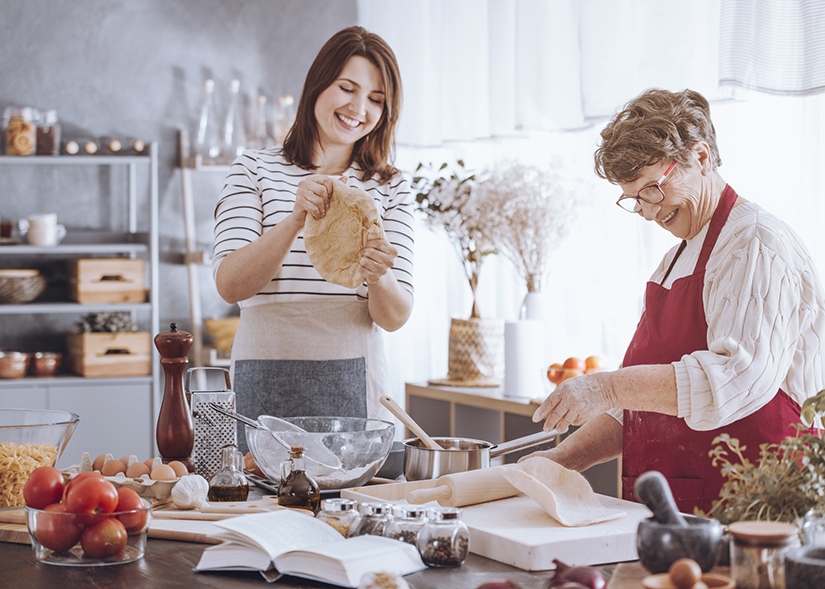By Barbara Glass
Making family holiday celebrations magical experiences takes that special family organizer who can relate to all family members regardless of age or personality: siblings, distant relatives, kids of assorted ages, plus older parents and grandparents.
The most challenging can be the elderly: they are sometimes limited in physical or cognitive abilities, calling for special arrangements by the adult children. Dr. Paul K. Chafetz, Dallas Clinical Psychologist and author of Loving Hard-to-Love Parents, recommends, “Adjust expectations to the person who is coming to the party. Give the gift of compassion and forgiveness in the spirit of the season. The gift of compassion is a gift to everyone.” Here are some tips to extend this compassion to elder relatives:
Plan ahead
The designated family organizer needs to plan well ahead of a family gathering. Ask for help from other family members for elements such as food preparation, shopping, transportation and group activities. If the older adult has memory challenges, the Alzheimer’s Association recommends that other family members be involved in the caregiving process. It is important as well for the host/hostess to get enough rest to be able to enjoy the party, too.
Include the elder in the planning process
Ask elder parents to participate in the preparation: wrapping presents, decorating, making cards, cooking a special recipe or recreating a holiday ritual from childhood – any easy way to involve the elders in helping the hostess will make the holiday celebration more special for everyone. If there are a lot of family members gathering, remember to ask other family members to assist with potluck dishes and arrangements leading up to the party.
Physical challenges
Plan activities that are possible within physical limitations: light displays, special performances, faith-based events, holiday movie matinees are all easily accessible and less burdensome on the older adult’s energy. Even go-go elders have their limits. Be prepared to abbreviate a mall trip: if the elder appears to be tiring, find a place to get a cup of tea and rest. Take care to not over-schedule your loved one’s energy reserve.
Health concerns
Know the elderly family member’s medication and rest schedule, and try to plan gatherings with these in mind. According to Harvard Medical School, older adults have a lower resilience to stress which can be brought about by interruption to a daily routine. Mindful scheduling and relaxation help to reduce stress.
Food and beverages
Attention to dietary needs is key. Older adults tend to eat less and sometimes forget to drink enough water. An imbalanced diet and dehydration can impact energy and mood. Best to have some non-alcoholic punch for the older adults as well as the children at the holiday gathering, along with small, healthy bites of food.
Family touchpoints
All families contain complicated personalities, but when gathering together, family members should set aside differences and be prepared to forgive random comments. As Dr. Paul Chafetz says, “The elder will arrive along with his or her personality. Some thoughtless comments might be made.” Holiday gatherings are meant for celebrating what connects us as family. The family organizer should focus on those connecting points and be prepared to forgive the differences.
Keep it simple and familiar
What is the “secret sauce” for entertaining elderly family members? For intergenerational parties, keep them as uncomplicated as possible and in familiar settings. Set the scene with familiar scents and quiet music. Arrange furniture for easy access to places for elders to sit. Keep the get-togethers on the less congested side. According to the Alzheimer’s Association, for those parents with cognitive issues, the fewer distractions the better. Dr. Chafetz suggests name tags for everyone to help the elderly identify who’s who. Party time with the whole family should be measured in easy-to-manage doses during the older adult’s best time of the day.
Family tree
One activity that engages elders is story-telling. Holidays are reflective occasions that prompt old folks to reminisce. Dust off the tape recorder or turn on your cell phone camera to capture these moments. Dr. Chafetz suggests a “genogram” of family members that can be displayed on a large wall. Similar to a “family tree,” this diagram would show generational relationships between family members, perhaps adding some story ideas under names. All you need is a large piece of paper, tape and some colored markers to create the genogram. This sort of connection through time is important for both adults and children, and a holiday gathering is the perfect time for this.
Holiday gatherings are great occasions to tell each other loving thoughts and give voice to what is most important. These moments are gifts to elders in the telling and children in the hearing.
Wrap up the occasion with a group photograph as a keepsake. Holidays are for making memories. Enjoy!


